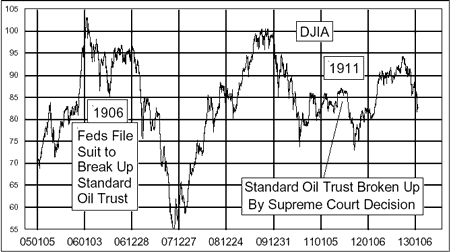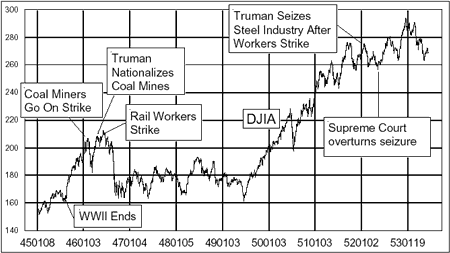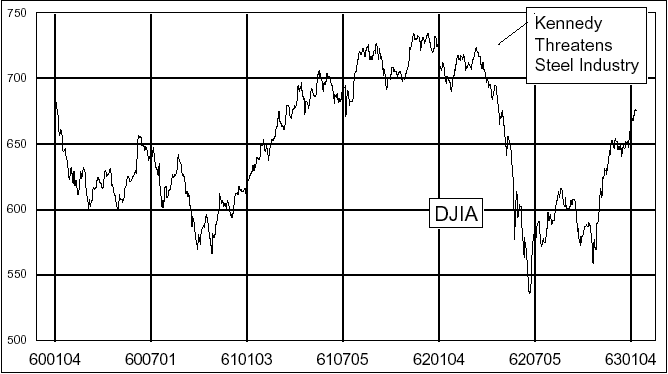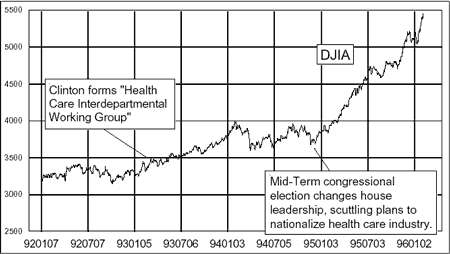The feds have turned their prying eyes on Big Tech, and, as we’ve seen throughout history, investors are paying a price for the uncertainty.
Specifically, Alphabet GOOG, +1.12% , Amazon AMZN, +1.52% , Facebook FB, +0.79% and Apple AAPL, +2.76% all saw their shares get hammered to start the week after reports surfaced last Friday that those high-flyers face regulatory scrutiny from the Trump administration.
Alphabet’s Google division, Amazon and Apple are all under investigation by the Justice Department, while the Federal Trade Commission is taking a look at Facebook. Those four companies are the straws that stir the tech drink, with a combined market capitalization of nearly $3 trillion.
Microsoft, which once faced a massive antitrust investigation, rounds out the top five of the most valuable U.S. tech companies. At this point, however, the software giant has avoided the recent crackdown.
Tom McClellan of McClellan Financial Publications wrote a piece this week taking a deep dive into how government involvement with Wall Street over the years has typically turned sour for investors.
“Without more pressing problems to occupy its time, the press and the politicians have turned their attention to what is wrong with Wall Street, and history shows that investors have not really appreciated such episodes,” he wrote.
McClellan, of course, isn’t suggesting that federal intervention isn’t at times necessary, or that allowing Wall Street to run wild is something to strive for — after all, look at what happened during the subprime mortgage crisis.
Rather, he’s just pointing out how that “the market does not respond very well while the spotlights of political attention are being focused on it.”
He used Microsoft as one of the examples:

He explained that Microsoft’s violation of the Sherman Antitrust Act played a big part in the pricking of the internet bubble. “Wall Street did not appreciate the politicos in Washington crashing their party, and a lot of ruin to share prices, portfolios, and actual companies has unfolded since then,” he said.
It’s not just tech investors that have felt the sting of government’s crosshairs. McClellan dialed it back more than a century ago for this example:

Breaking up Standard Oil marked the beginning of a deep slide for the Dow, which dropped from a high of 102.9 in January of 1906 to a low of 53.08 in November of 1907. It would take a decade before the Dow would return to its pre-breakup highs.
“We are not saying that the government was wrong for breaking up Standard Oil’s monopoly,” McClellan said, “just that the market did not appreciate it.”
Then, after World War II, President Truman nationalized rails, coal and steel, weighing heavily on the Dow for the years that followed.

Fast forward to the Kennedy years, and the president’s threats to the steel executives, who were facing a strike, clearly weren’t welcomed by investors.

“Wall Street took a dim view of this overt pressure, and the DJIA immediately went into a sharp 4-month slide,” McClellan wrote. “The severity of the drop was no doubt exacerbated by the fact that it came during the second year of Kennedy’s term, which is the year when most bear markets appear.”
More recently, President Clinton’s bid to work toward nationalized healthcare sent shivers through an industry that constituted almost 20% of the entire economy. The fears, as McClellan shows, were reflected in the market.

“The DJIA remained flat in one of the tightest trading ranges in history, until the mid-term elections in November 1994 resulted in a change in the majority party in congress and an end to the prospects of nationalized health care,” he said. “The market reacted positively to the withdrawal of this potential burden.”
The clear theme from this historical tour — and it’s not surprising — is that Wall Street, for better or worse, would prefer to be left to its own devices.
“For as long as Wall Street perceives that Washington is looking over its shoulder, the major averages are not going to do as well as they would have if Washington’s attention was directed elsewhere, McClellan said.
It’s all part of the healing process.
“Unlike politicians, crooked CEOs get fired easily, crooked companies get the death penalty, and life goes on,” McClellan wrote. “And the oversold condition that the attention has created will rebound.”
There was definitely a taking place in Tuesday’s trading session, with the Dow DJIA, +1.57% up more than 400 points in midday action.











